
-
Find the right food for your petTake this quiz to see which food may be the best for your furry friend.Find the right food for your petTake this quiz to see which food may be the best for your furry friend.Featured products
 Mature Adult Dog Food
Mature Adult Dog FoodHill's Science Plan Mature Adult Multipack Wet Dog Food with Chicken & Beef are complete premium pet foods for mature adult dogs from 7 years. Your dog will love these deliciously smooth and savoury minced loaves, formulated to deliver the appropriate amount of energy to support the needs of adult dogs.
Shop Now Adult Wet Dog Food with Beef
Adult Wet Dog Food with BeefHill's Science Plan Adult Multipack Wet Dog Food with Chicken, Beef & Turkey are complete premium pet foods for adult dogs from 1 year. Your dog will love these deliciously smooth and savoury minced loaves, formulated for balanced nutrition and overall health.
Shop Now Puppy Food
Puppy FoodHill's Science Plan Puppy Multipack Wet Dog Food with Chicken & Beef are complete premium pet foods for growing puppies from weaning until 1 year old and for pregnant and nursing dogs. Your puppy will love these deliciously smooth and savoury minced loaves, formulated for balanced nutrition and overall health.
Shop NowFeatured products Adult Multipack Wet Cat Food with Beef, Ocean Fish & Chicken
Adult Multipack Wet Cat Food with Beef, Ocean Fish & ChickenTender chunks in gravy for cats, with high-quality protein to maintain lean muscle. With vitamin E and omega-3s & -6s for healthy skin and balanced minerals to support healthy vital organs.
Shop Now Mature Adult Wet Cat Food with Chicken
Mature Adult Wet Cat Food with Chicken
Tender chicken chunks in gravy for mature adult cats. Made with easy-to-digest ingredients, high-quality protein for lean muscle maintenance and antioxidant vitamins C+E for optimal health.
Shop Now Light Adult Multipack Wet Cat Food with Chicken & Ocean Fish
Light Adult Multipack Wet Cat Food with Chicken & Ocean FishTender chicken chunks in gravy for cats, with L-carnitine and fewer calories for ideal weight management. Packed with high-quality protein, omega-6s, and vitamin E for shiny fur and healthy skin.
Shop Now -
Dog
- Dog Tips & Articles
-
Health Category
- Weight
- Food & Environmental Sensitivities
- Urinary
- Digestive
- Joint
- Kidney
-
Life Stage
- Puppy Nutrition
- Adult Nutrition
- Senior Nutrition
Cat- Cat Tips & Articles
-
Health Category
- Weight
- Skin & Food Sensitivities
- Urinary
- Digestive
- Kidney
-
Life Stage
- Kitten Nutrition
- Adult Nutrition
Featured articles The Incredible Science Behind Your Pet's Microbiome
The Incredible Science Behind Your Pet's MicrobiomeLearn what your pet's microbiome is, how it contributes to your pet's gut and overall health, and why nutrition is important in maintaining healthy microbiomes.
Read More Show some love with wet foods: a great choice for pets with health issues
Show some love with wet foods: a great choice for pets with health issuesShow some love with wet foods: a great choice for pets with health issues.
Read More The Right Diet For Your Pet
The Right Diet For Your PetIn people, the right diet is very important. If you are eating the wrong way for your metabolism, activity level, age and lifestyle you could end up with health issues.
Read More -


What exactly are hairballs?
Cats are very clean creatures. In fact, your cat or kitten will spend up to half their day grooming themselves, which is a solid time commitment! In doing so, they'll pick up any loose hairs from their coat. These are difficult to spit out, especially as cats have a barbed tongue, so the hairs will probably be swallowed. Most of the time, this will cause no problems whatsoever and the hairs will just pass through the digestive tract. Sometimes, however, the hairs can remain in the stomach and form a hairball, or fur ball as some people call them.
How does the hairball get out?
Usually, once a hairball has reached a certain size, the cat vomits it up (look out for sausage-like balls of hair), although some will pass hair in their stools. Either way, it rarely causes much distress. Every now and again, a hairball can be difficult to get rid of and the affected cat may have repeated bouts of ‘gagging’ or vomiting. If you are at all concerned, don't hesitate to call your vet.
In some very rare cases, a cat may be unable to pass the hairball naturally and surgery may be required. Thankfully, this is very unusual.
Underlying causes of hairballs
If hairballs are not normally an issue for your cat, but you suddenly start noticing them, there may be something else going on. Parasites and skin disease can cause itching and excessive grooming, but so can abdominal pain and stress.
Cats are very sensitive creatures and can become easily stressed. This is usually because of conflict with other cats in the house or in the neighbourhood. Chronic stress in cats can cause bladder problems called Feline Idiopathic Cystitis (FIC). This is a painful condition and can be very serious if the bladder becomes blocked. One of the earliest signs of this pain and stress can be overgrooming, which you may notice especially around the tummy area.
So you see, hair loss and hairballs can sometimes be the first subtle signs of another issue. If you’re ever concerned that something has changed, seek advice from your vet.


Tasty Tips

How can you help to prevent hairballs?
One of the best ways to help prevent hairballs is to groom your cat regularly. Get into the habit of gently doing this when they are very young, so they get used to it.
Preventing a bad hair day
The type of grooming brush you use can be important; your vet can offer you advice on which one is best for your cat. Many people with short-haired cats favour a rubber brush or a grooming mitten or glove. They're soft enough not to cause any discomfort but great at removing loose hair.
If you have a long-haired cat, you'll need to be even more diligent with grooming. Some long-haired breeds like Persians have coats that are so long they can be difficult for the cat to properly groom by themselves. Make sure you are absolutely committed to caring for this kind of coat before taking on such a cat. Short hair is much more natural for a cat and easier for everyone to manage.
You'll need to step up the regularity of your brushing during spring and summer, when your cat will moult more heavily. This needn't be a chore, though. It can be a good way for you and your cat to bond. A cuddle or a game is a nice way to round off a brushing session.
Can diet have a role in preventing hairballs?
There is evidence that a high-fibre, dry food can help reduce the formation of hairballs in the gut. The fibre helps to trap the hairs and keep them moving through the intestines without clumping up in the stomach. Ask your vet for advice.
Remember - hairballs may not be nice but they're rarely anything to worry about.
Seeing your cat struggle with a hairball can be upsetting, but it's important to remember that most cats have problems with them from time to time, and there's hardly ever any reason for real concern.
Reviewed by Dr. Hein Meyer, DVM, PhD, Dipl-ECVIM-CA and Dr. Emma Milne BVSc FRCVS


One of our staff authors prepared this article for you
Related products

Hill's Science Plan Hairball & Perfect Coat Adult Cat Food with Chicken is formulated to effectively help avoid hairball formation in adult cats while promoting a beautiful coat. Thanks to its mix of essential omega-6 fatty acids, this food benefits the cat's skin and fur, keeping them healthy and shiny. Our Advanced Fibre Technology helps reduce hairballs by naturally promoting their passage through the gut. This food is formulated with high-quality protein for a perfectly balanced, great-tasting recipe.
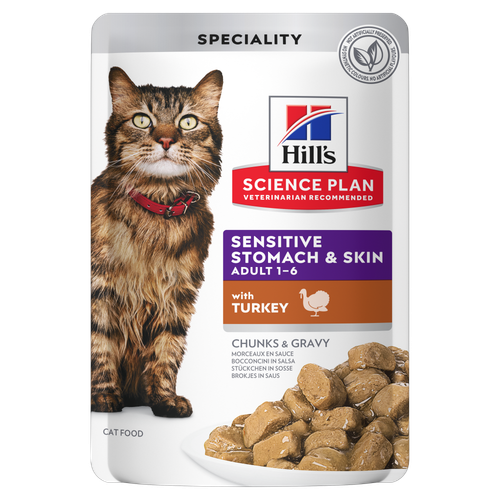
Hill's Science Plan Sensitive Stomach & Skin Adult Wet Cat Food with Turkey is a complete pet food for adult cats, aged 1–6 years. This highly digestible wet food comes in a pouch and supports healthy digestion, as well as nourishes skin and promotes a thick and lustrous coat.
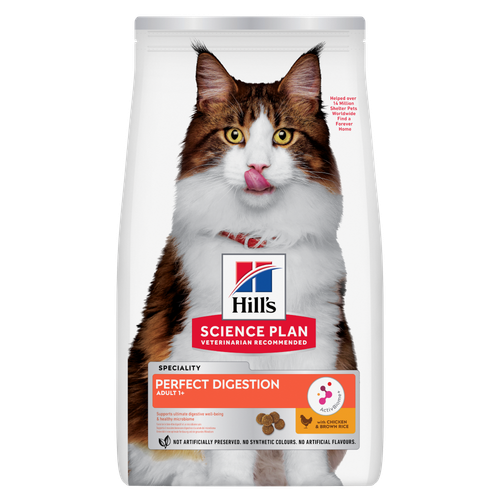
Hill's Science Plan Perfect Digestion Cat Food with Chicken & Brown Rice nourishes your cat's unique microbiome and helps them reach their full potential.

Hill's Science Plan Adult Sterilised Cat Dry Food with Salmon is specially formulated with ActivBiome+ Multi-Benefit Technology. It is a precisely balanced nutrition, tailored to meet the needs of sterilised cats, to help keep them lean & healthy.
Related articles
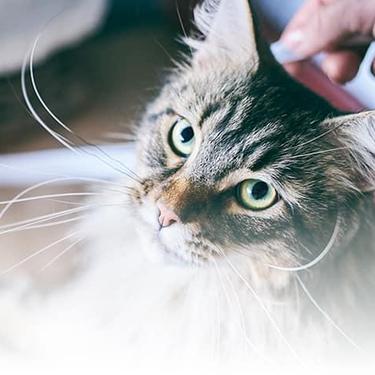
Learn how to make homemade cat treats that are healthy for your pet with this recipe from Hills Pet Nutrition.
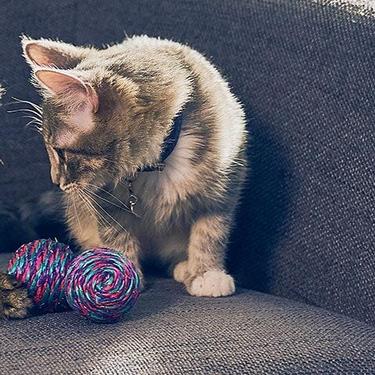
Kittens grow a lot in their first year, so it is important to provide them with the proper nutrients early, so they grow up healthy and strong. Learn more.

There are three common ways to feed a cat. Each way has its advantages and disadvantages.
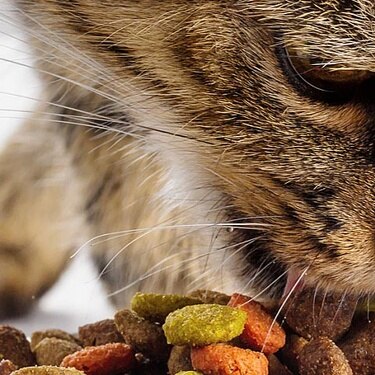
From essential vitamins & minerals to different types of meat, learn what to look for when choosing the best cat food for your feline.

Put your cat on a diet without them knowing
Our low calorie formula helps you control your cat's weight. It's packed with high-quality protein for building lean muscles, and made with purposeful ingredients for a flavourful, nutritious meal. Clinically proven antioxidants, Vitamin C+E, help promote a healthy immune system.
Put your cat on a diet without them knowing
Our low calorie formula helps you control your cat's weight. It's packed with high-quality protein for building lean muscles, and made with purposeful ingredients for a flavourful, nutritious meal. Clinically proven antioxidants, Vitamin C+E, help promote a healthy immune system.

